International Human Resource Management: Cultural Dimensions Analysis
VerifiedAdded on 2022/12/27
|15
|4970
|455
Report
AI Summary
This report provides a detailed analysis of International Human Resource Management (IHRM), focusing on the application of cultural dimensions to the context of Prochile, an agency under the Ministry of Foreign Affairs of Chile. The report examines various cultural frameworks, including Hofstede's cultural dimensions (Power Distance Index, Individualism vs. Collectivism, Masculinity vs. Femininity, Uncertainty Avoidance Index, Long-term vs. Short-term Orientation, and Indulgence vs. Restraint), Trompenaars & Hampden-Turner's cultural dimensions (Universalism vs. Particularism, Individualism vs. Communitarianism, Neutral vs. Affective, Specific vs. Diffuse, Achievement vs. Ascription, Sequential vs. Synchronous Time, and Internal vs. External Direction), and the GLOBE study's dimensions of culture. The report analyzes how these cultural dimensions impact Prochile's operations, particularly in the context of its new office in Houston and its interactions with the Chinese market, offering insights into how to effectively manage human resources across different cultural contexts. It highlights the importance of understanding cultural differences to improve business practices, build effective relationships, and achieve organizational goals. The report also discusses the strengths, weaknesses, opportunities, and threats (SWOT) of Prochile and concludes with recommendations for improving its IHRM practices.
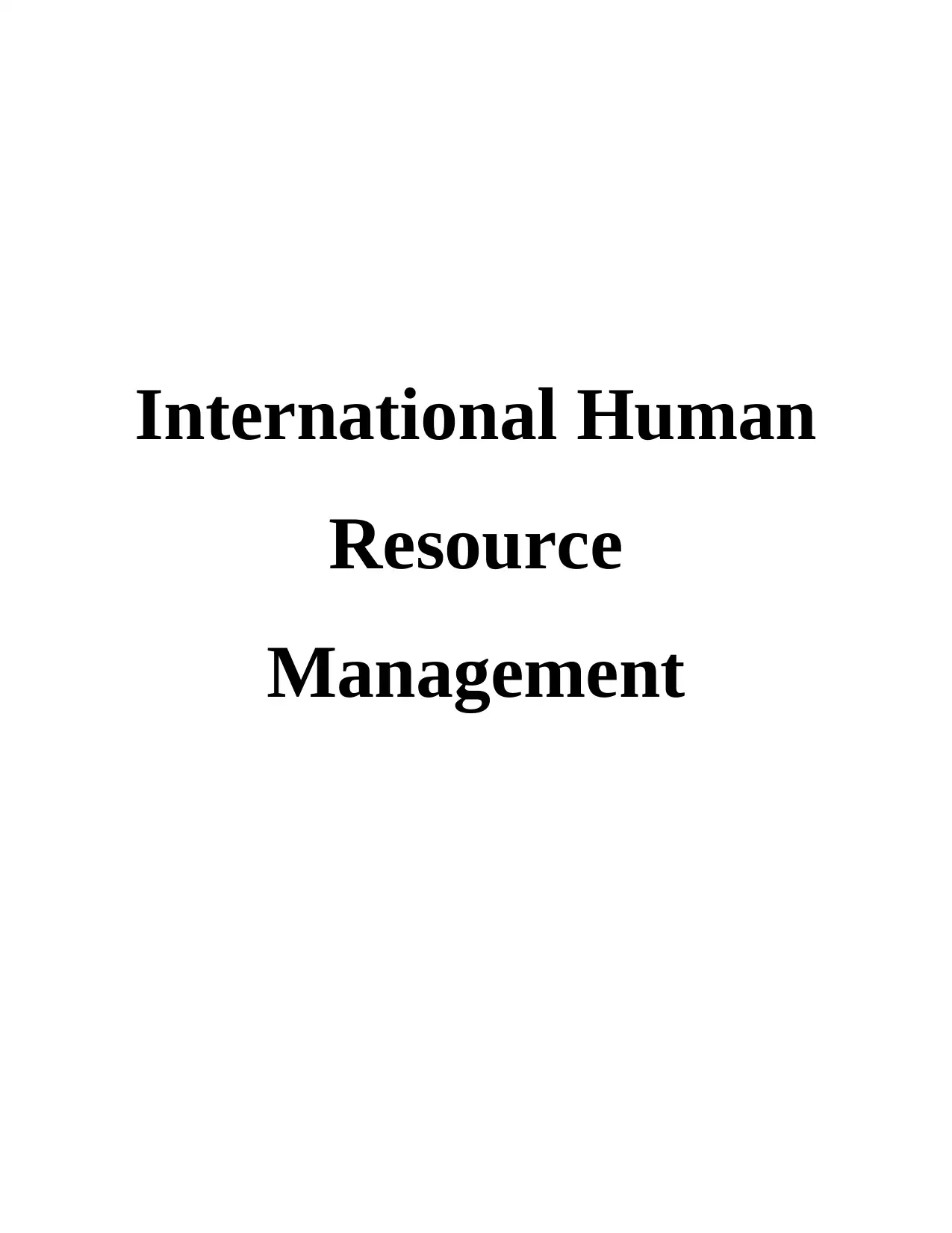
International Human
Resource
Management
Resource
Management
Paraphrase This Document
Need a fresh take? Get an instant paraphrase of this document with our AI Paraphraser
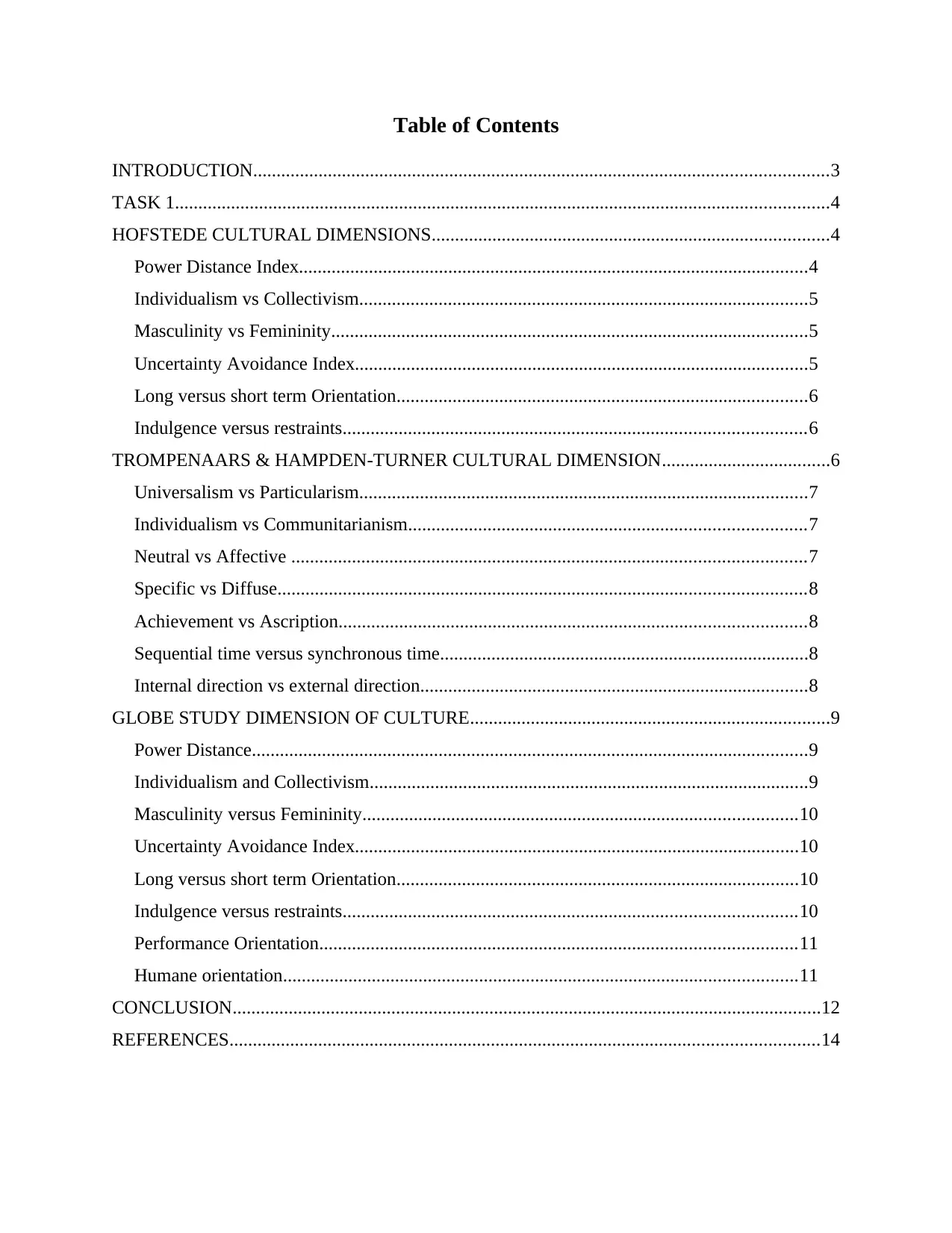
Table of Contents
INTRODUCTION...........................................................................................................................3
TASK 1............................................................................................................................................4
HOFSTEDE CULTURAL DIMENSIONS.....................................................................................4
Power Distance Index.............................................................................................................4
Individualism vs Collectivism................................................................................................5
Masculinity vs Femininity......................................................................................................5
Uncertainty Avoidance Index.................................................................................................5
Long versus short term Orientation........................................................................................6
Indulgence versus restraints...................................................................................................6
TROMPENAARS & HAMPDEN-TURNER CULTURAL DIMENSION....................................6
Universalism vs Particularism................................................................................................7
Individualism vs Communitarianism.....................................................................................7
Neutral vs Affective ..............................................................................................................7
Specific vs Diffuse.................................................................................................................8
Achievement vs Ascription....................................................................................................8
Sequential time versus synchronous time...............................................................................8
Internal direction vs external direction...................................................................................8
GLOBE STUDY DIMENSION OF CULTURE.............................................................................9
Power Distance.......................................................................................................................9
Individualism and Collectivism..............................................................................................9
Masculinity versus Femininity.............................................................................................10
Uncertainty Avoidance Index...............................................................................................10
Long versus short term Orientation......................................................................................10
Indulgence versus restraints.................................................................................................10
Performance Orientation......................................................................................................11
Humane orientation..............................................................................................................11
CONCLUSION..............................................................................................................................12
REFERENCES..............................................................................................................................14
INTRODUCTION...........................................................................................................................3
TASK 1............................................................................................................................................4
HOFSTEDE CULTURAL DIMENSIONS.....................................................................................4
Power Distance Index.............................................................................................................4
Individualism vs Collectivism................................................................................................5
Masculinity vs Femininity......................................................................................................5
Uncertainty Avoidance Index.................................................................................................5
Long versus short term Orientation........................................................................................6
Indulgence versus restraints...................................................................................................6
TROMPENAARS & HAMPDEN-TURNER CULTURAL DIMENSION....................................6
Universalism vs Particularism................................................................................................7
Individualism vs Communitarianism.....................................................................................7
Neutral vs Affective ..............................................................................................................7
Specific vs Diffuse.................................................................................................................8
Achievement vs Ascription....................................................................................................8
Sequential time versus synchronous time...............................................................................8
Internal direction vs external direction...................................................................................8
GLOBE STUDY DIMENSION OF CULTURE.............................................................................9
Power Distance.......................................................................................................................9
Individualism and Collectivism..............................................................................................9
Masculinity versus Femininity.............................................................................................10
Uncertainty Avoidance Index...............................................................................................10
Long versus short term Orientation......................................................................................10
Indulgence versus restraints.................................................................................................10
Performance Orientation......................................................................................................11
Humane orientation..............................................................................................................11
CONCLUSION..............................................................................................................................12
REFERENCES..............................................................................................................................14
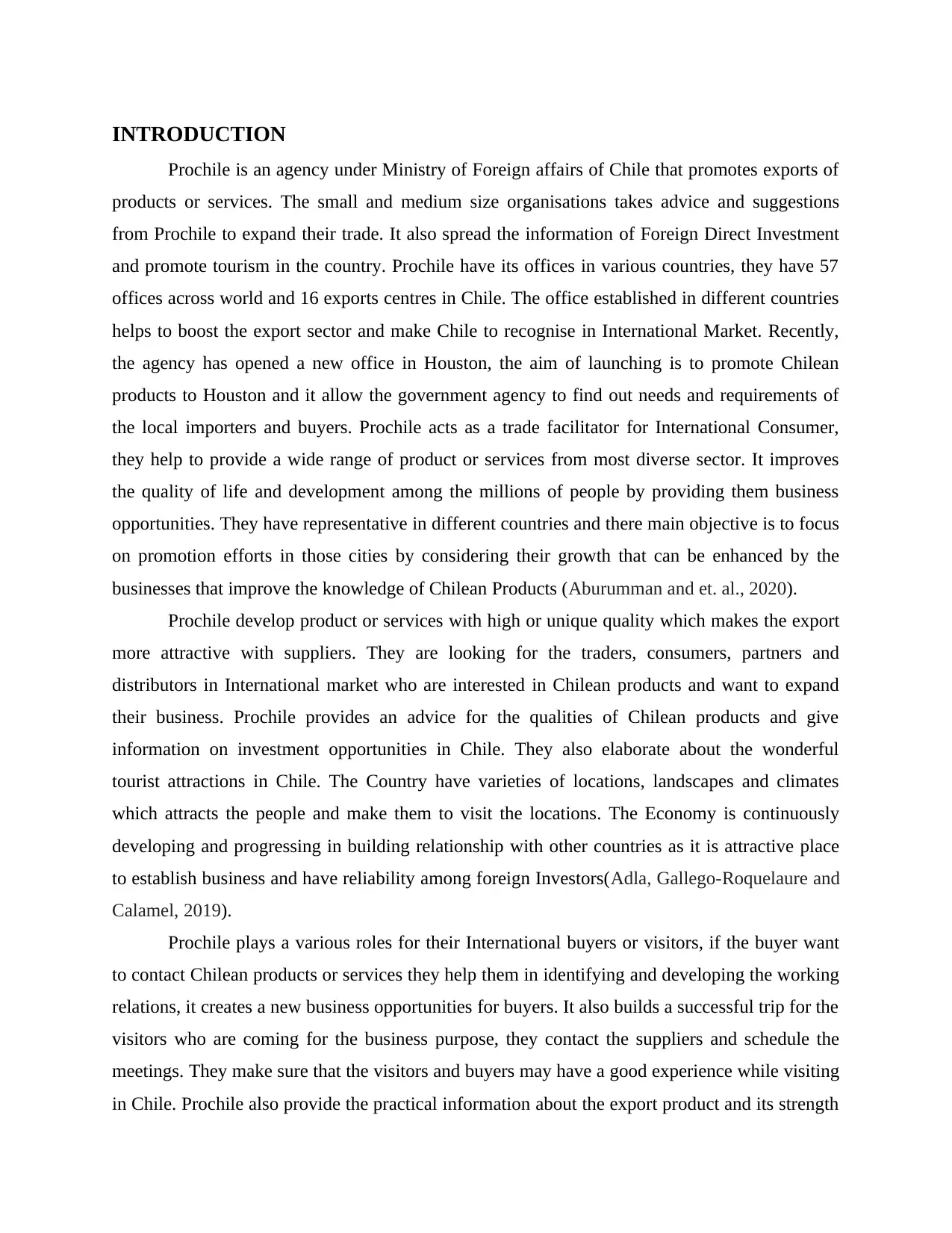
INTRODUCTION
Prochile is an agency under Ministry of Foreign affairs of Chile that promotes exports of
products or services. The small and medium size organisations takes advice and suggestions
from Prochile to expand their trade. It also spread the information of Foreign Direct Investment
and promote tourism in the country. Prochile have its offices in various countries, they have 57
offices across world and 16 exports centres in Chile. The office established in different countries
helps to boost the export sector and make Chile to recognise in International Market. Recently,
the agency has opened a new office in Houston, the aim of launching is to promote Chilean
products to Houston and it allow the government agency to find out needs and requirements of
the local importers and buyers. Prochile acts as a trade facilitator for International Consumer,
they help to provide a wide range of product or services from most diverse sector. It improves
the quality of life and development among the millions of people by providing them business
opportunities. They have representative in different countries and there main objective is to focus
on promotion efforts in those cities by considering their growth that can be enhanced by the
businesses that improve the knowledge of Chilean Products (Aburumman and et. al., 2020).
Prochile develop product or services with high or unique quality which makes the export
more attractive with suppliers. They are looking for the traders, consumers, partners and
distributors in International market who are interested in Chilean products and want to expand
their business. Prochile provides an advice for the qualities of Chilean products and give
information on investment opportunities in Chile. They also elaborate about the wonderful
tourist attractions in Chile. The Country have varieties of locations, landscapes and climates
which attracts the people and make them to visit the locations. The Economy is continuously
developing and progressing in building relationship with other countries as it is attractive place
to establish business and have reliability among foreign Investors(Adla, Gallego-Roquelaure and
Calamel, 2019).
Prochile plays a various roles for their International buyers or visitors, if the buyer want
to contact Chilean products or services they help them in identifying and developing the working
relations, it creates a new business opportunities for buyers. It also builds a successful trip for the
visitors who are coming for the business purpose, they contact the suppliers and schedule the
meetings. They make sure that the visitors and buyers may have a good experience while visiting
in Chile. Prochile also provide the practical information about the export product and its strength
Prochile is an agency under Ministry of Foreign affairs of Chile that promotes exports of
products or services. The small and medium size organisations takes advice and suggestions
from Prochile to expand their trade. It also spread the information of Foreign Direct Investment
and promote tourism in the country. Prochile have its offices in various countries, they have 57
offices across world and 16 exports centres in Chile. The office established in different countries
helps to boost the export sector and make Chile to recognise in International Market. Recently,
the agency has opened a new office in Houston, the aim of launching is to promote Chilean
products to Houston and it allow the government agency to find out needs and requirements of
the local importers and buyers. Prochile acts as a trade facilitator for International Consumer,
they help to provide a wide range of product or services from most diverse sector. It improves
the quality of life and development among the millions of people by providing them business
opportunities. They have representative in different countries and there main objective is to focus
on promotion efforts in those cities by considering their growth that can be enhanced by the
businesses that improve the knowledge of Chilean Products (Aburumman and et. al., 2020).
Prochile develop product or services with high or unique quality which makes the export
more attractive with suppliers. They are looking for the traders, consumers, partners and
distributors in International market who are interested in Chilean products and want to expand
their business. Prochile provides an advice for the qualities of Chilean products and give
information on investment opportunities in Chile. They also elaborate about the wonderful
tourist attractions in Chile. The Country have varieties of locations, landscapes and climates
which attracts the people and make them to visit the locations. The Economy is continuously
developing and progressing in building relationship with other countries as it is attractive place
to establish business and have reliability among foreign Investors(Adla, Gallego-Roquelaure and
Calamel, 2019).
Prochile plays a various roles for their International buyers or visitors, if the buyer want
to contact Chilean products or services they help them in identifying and developing the working
relations, it creates a new business opportunities for buyers. It also builds a successful trip for the
visitors who are coming for the business purpose, they contact the suppliers and schedule the
meetings. They make sure that the visitors and buyers may have a good experience while visiting
in Chile. Prochile also provide the practical information about the export product and its strength
⊘ This is a preview!⊘
Do you want full access?
Subscribe today to unlock all pages.

Trusted by 1+ million students worldwide
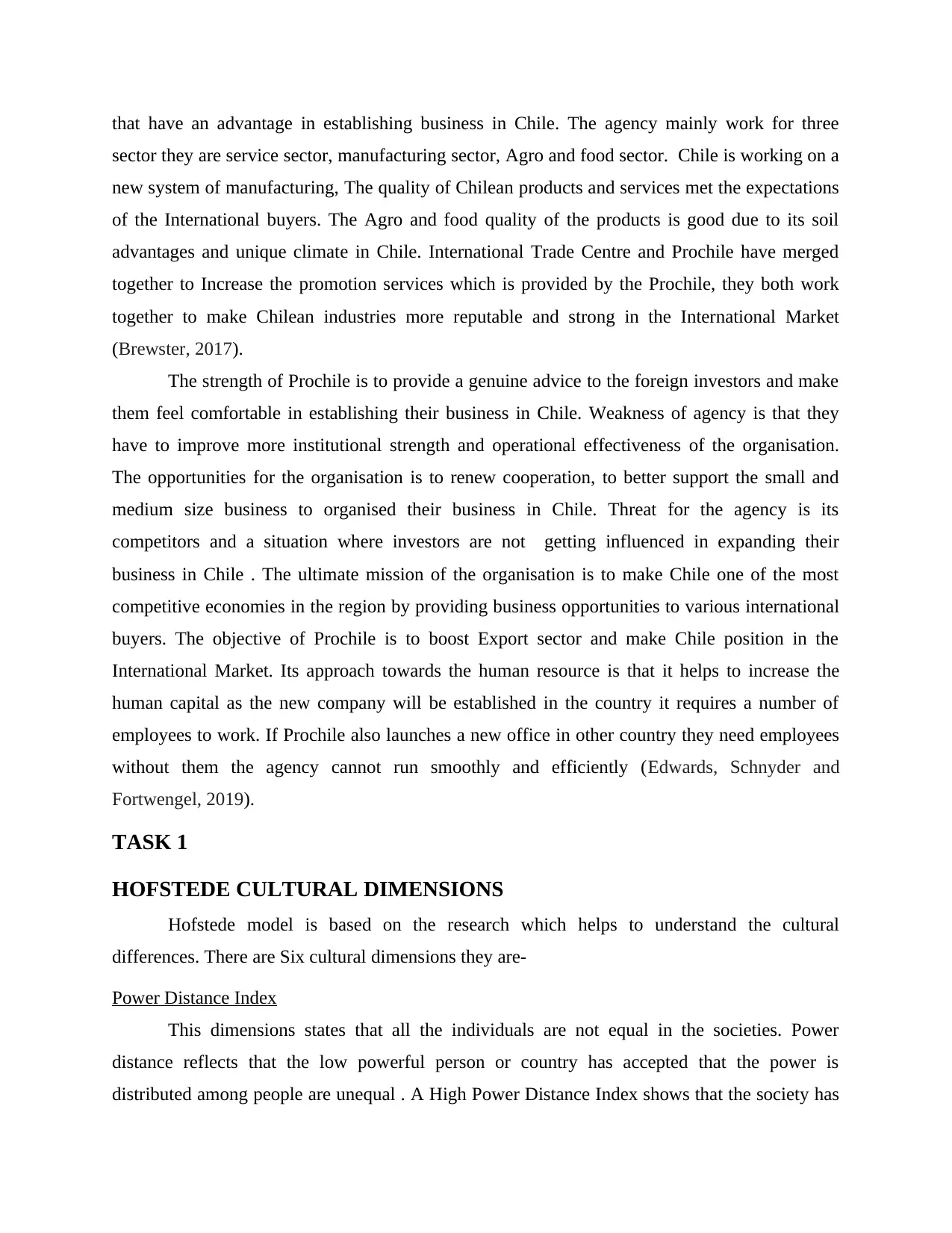
that have an advantage in establishing business in Chile. The agency mainly work for three
sector they are service sector, manufacturing sector, Agro and food sector. Chile is working on a
new system of manufacturing, The quality of Chilean products and services met the expectations
of the International buyers. The Agro and food quality of the products is good due to its soil
advantages and unique climate in Chile. International Trade Centre and Prochile have merged
together to Increase the promotion services which is provided by the Prochile, they both work
together to make Chilean industries more reputable and strong in the International Market
(Brewster, 2017).
The strength of Prochile is to provide a genuine advice to the foreign investors and make
them feel comfortable in establishing their business in Chile. Weakness of agency is that they
have to improve more institutional strength and operational effectiveness of the organisation.
The opportunities for the organisation is to renew cooperation, to better support the small and
medium size business to organised their business in Chile. Threat for the agency is its
competitors and a situation where investors are not getting influenced in expanding their
business in Chile . The ultimate mission of the organisation is to make Chile one of the most
competitive economies in the region by providing business opportunities to various international
buyers. The objective of Prochile is to boost Export sector and make Chile position in the
International Market. Its approach towards the human resource is that it helps to increase the
human capital as the new company will be established in the country it requires a number of
employees to work. If Prochile also launches a new office in other country they need employees
without them the agency cannot run smoothly and efficiently (Edwards, Schnyder and
Fortwengel, 2019).
TASK 1
HOFSTEDE CULTURAL DIMENSIONS
Hofstede model is based on the research which helps to understand the cultural
differences. There are Six cultural dimensions they are-
Power Distance Index
This dimensions states that all the individuals are not equal in the societies. Power
distance reflects that the low powerful person or country has accepted that the power is
distributed among people are unequal . A High Power Distance Index shows that the society has
sector they are service sector, manufacturing sector, Agro and food sector. Chile is working on a
new system of manufacturing, The quality of Chilean products and services met the expectations
of the International buyers. The Agro and food quality of the products is good due to its soil
advantages and unique climate in Chile. International Trade Centre and Prochile have merged
together to Increase the promotion services which is provided by the Prochile, they both work
together to make Chilean industries more reputable and strong in the International Market
(Brewster, 2017).
The strength of Prochile is to provide a genuine advice to the foreign investors and make
them feel comfortable in establishing their business in Chile. Weakness of agency is that they
have to improve more institutional strength and operational effectiveness of the organisation.
The opportunities for the organisation is to renew cooperation, to better support the small and
medium size business to organised their business in Chile. Threat for the agency is its
competitors and a situation where investors are not getting influenced in expanding their
business in Chile . The ultimate mission of the organisation is to make Chile one of the most
competitive economies in the region by providing business opportunities to various international
buyers. The objective of Prochile is to boost Export sector and make Chile position in the
International Market. Its approach towards the human resource is that it helps to increase the
human capital as the new company will be established in the country it requires a number of
employees to work. If Prochile also launches a new office in other country they need employees
without them the agency cannot run smoothly and efficiently (Edwards, Schnyder and
Fortwengel, 2019).
TASK 1
HOFSTEDE CULTURAL DIMENSIONS
Hofstede model is based on the research which helps to understand the cultural
differences. There are Six cultural dimensions they are-
Power Distance Index
This dimensions states that all the individuals are not equal in the societies. Power
distance reflects that the low powerful person or country has accepted that the power is
distributed among people are unequal . A High Power Distance Index shows that the society has
Paraphrase This Document
Need a fresh take? Get an instant paraphrase of this document with our AI Paraphraser
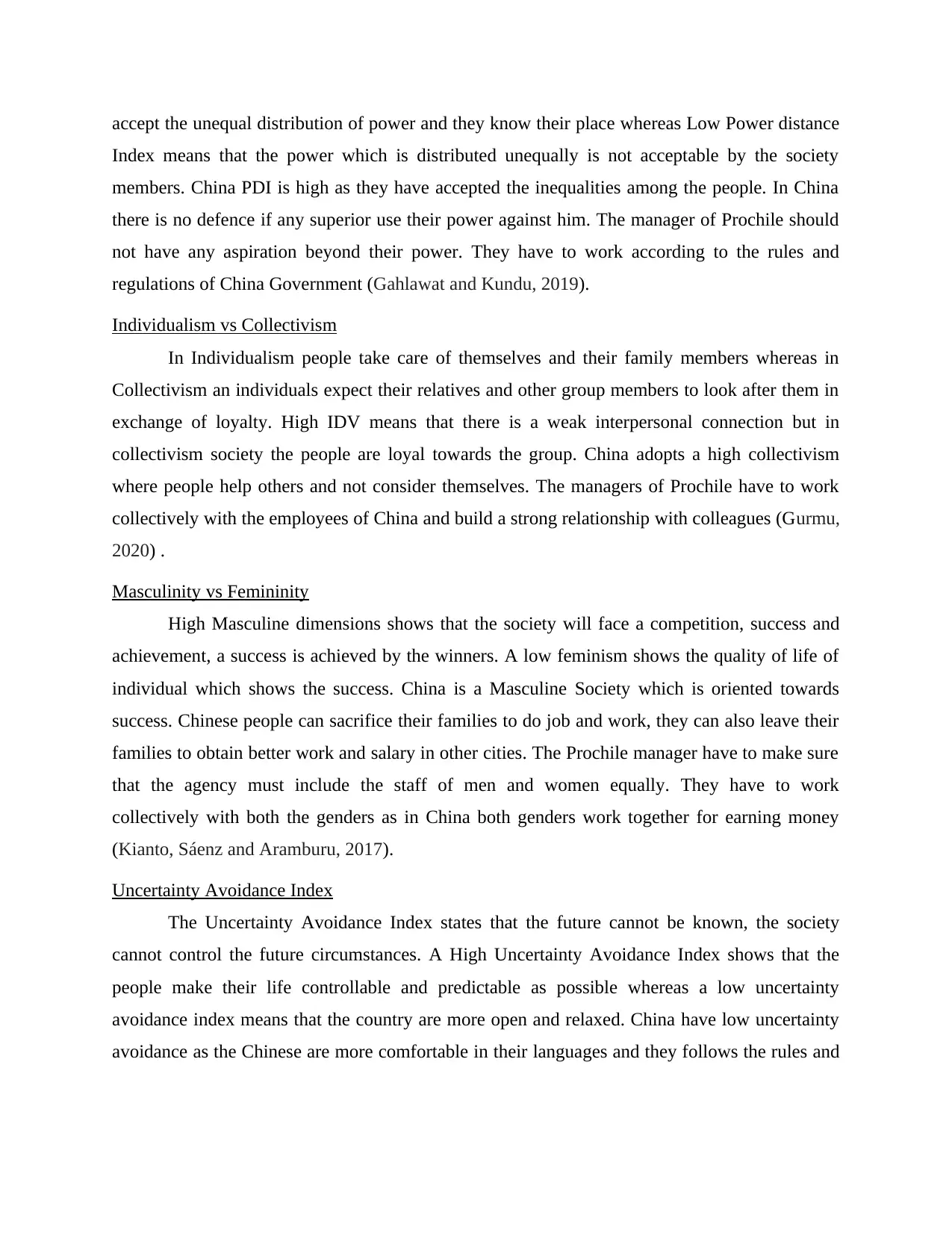
accept the unequal distribution of power and they know their place whereas Low Power distance
Index means that the power which is distributed unequally is not acceptable by the society
members. China PDI is high as they have accepted the inequalities among the people. In China
there is no defence if any superior use their power against him. The manager of Prochile should
not have any aspiration beyond their power. They have to work according to the rules and
regulations of China Government (Gahlawat and Kundu, 2019).
Individualism vs Collectivism
In Individualism people take care of themselves and their family members whereas in
Collectivism an individuals expect their relatives and other group members to look after them in
exchange of loyalty. High IDV means that there is a weak interpersonal connection but in
collectivism society the people are loyal towards the group. China adopts a high collectivism
where people help others and not consider themselves. The managers of Prochile have to work
collectively with the employees of China and build a strong relationship with colleagues (Gurmu,
2020) .
Masculinity vs Femininity
High Masculine dimensions shows that the society will face a competition, success and
achievement, a success is achieved by the winners. A low feminism shows the quality of life of
individual which shows the success. China is a Masculine Society which is oriented towards
success. Chinese people can sacrifice their families to do job and work, they can also leave their
families to obtain better work and salary in other cities. The Prochile manager have to make sure
that the agency must include the staff of men and women equally. They have to work
collectively with both the genders as in China both genders work together for earning money
(Kianto, Sáenz and Aramburu, 2017).
Uncertainty Avoidance Index
The Uncertainty Avoidance Index states that the future cannot be known, the society
cannot control the future circumstances. A High Uncertainty Avoidance Index shows that the
people make their life controllable and predictable as possible whereas a low uncertainty
avoidance index means that the country are more open and relaxed. China have low uncertainty
avoidance as the Chinese are more comfortable in their languages and they follows the rules and
Index means that the power which is distributed unequally is not acceptable by the society
members. China PDI is high as they have accepted the inequalities among the people. In China
there is no defence if any superior use their power against him. The manager of Prochile should
not have any aspiration beyond their power. They have to work according to the rules and
regulations of China Government (Gahlawat and Kundu, 2019).
Individualism vs Collectivism
In Individualism people take care of themselves and their family members whereas in
Collectivism an individuals expect their relatives and other group members to look after them in
exchange of loyalty. High IDV means that there is a weak interpersonal connection but in
collectivism society the people are loyal towards the group. China adopts a high collectivism
where people help others and not consider themselves. The managers of Prochile have to work
collectively with the employees of China and build a strong relationship with colleagues (Gurmu,
2020) .
Masculinity vs Femininity
High Masculine dimensions shows that the society will face a competition, success and
achievement, a success is achieved by the winners. A low feminism shows the quality of life of
individual which shows the success. China is a Masculine Society which is oriented towards
success. Chinese people can sacrifice their families to do job and work, they can also leave their
families to obtain better work and salary in other cities. The Prochile manager have to make sure
that the agency must include the staff of men and women equally. They have to work
collectively with both the genders as in China both genders work together for earning money
(Kianto, Sáenz and Aramburu, 2017).
Uncertainty Avoidance Index
The Uncertainty Avoidance Index states that the future cannot be known, the society
cannot control the future circumstances. A High Uncertainty Avoidance Index shows that the
people make their life controllable and predictable as possible whereas a low uncertainty
avoidance index means that the country are more open and relaxed. China have low uncertainty
avoidance as the Chinese are more comfortable in their languages and they follows the rules and
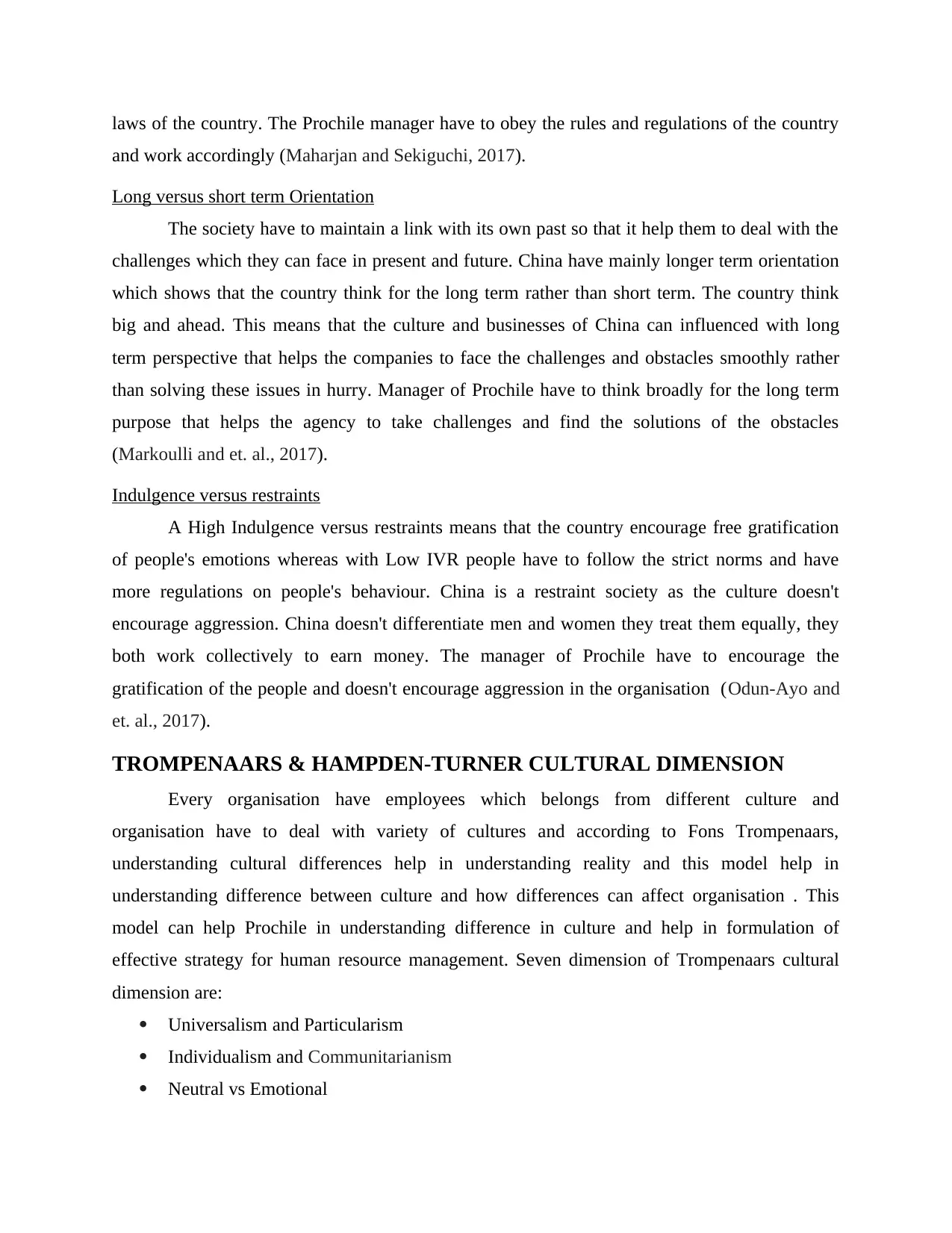
laws of the country. The Prochile manager have to obey the rules and regulations of the country
and work accordingly (Maharjan and Sekiguchi, 2017).
Long versus short term Orientation
The society have to maintain a link with its own past so that it help them to deal with the
challenges which they can face in present and future. China have mainly longer term orientation
which shows that the country think for the long term rather than short term. The country think
big and ahead. This means that the culture and businesses of China can influenced with long
term perspective that helps the companies to face the challenges and obstacles smoothly rather
than solving these issues in hurry. Manager of Prochile have to think broadly for the long term
purpose that helps the agency to take challenges and find the solutions of the obstacles
(Markoulli and et. al., 2017).
Indulgence versus restraints
A High Indulgence versus restraints means that the country encourage free gratification
of people's emotions whereas with Low IVR people have to follow the strict norms and have
more regulations on people's behaviour. China is a restraint society as the culture doesn't
encourage aggression. China doesn't differentiate men and women they treat them equally, they
both work collectively to earn money. The manager of Prochile have to encourage the
gratification of the people and doesn't encourage aggression in the organisation (Odun-Ayo and
et. al., 2017).
TROMPENAARS & HAMPDEN-TURNER CULTURAL DIMENSION
Every organisation have employees which belongs from different culture and
organisation have to deal with variety of cultures and according to Fons Trompenaars,
understanding cultural differences help in understanding reality and this model help in
understanding difference between culture and how differences can affect organisation . This
model can help Prochile in understanding difference in culture and help in formulation of
effective strategy for human resource management. Seven dimension of Trompenaars cultural
dimension are:
Universalism and Particularism
Individualism and Communitarianism
Neutral vs Emotional
and work accordingly (Maharjan and Sekiguchi, 2017).
Long versus short term Orientation
The society have to maintain a link with its own past so that it help them to deal with the
challenges which they can face in present and future. China have mainly longer term orientation
which shows that the country think for the long term rather than short term. The country think
big and ahead. This means that the culture and businesses of China can influenced with long
term perspective that helps the companies to face the challenges and obstacles smoothly rather
than solving these issues in hurry. Manager of Prochile have to think broadly for the long term
purpose that helps the agency to take challenges and find the solutions of the obstacles
(Markoulli and et. al., 2017).
Indulgence versus restraints
A High Indulgence versus restraints means that the country encourage free gratification
of people's emotions whereas with Low IVR people have to follow the strict norms and have
more regulations on people's behaviour. China is a restraint society as the culture doesn't
encourage aggression. China doesn't differentiate men and women they treat them equally, they
both work collectively to earn money. The manager of Prochile have to encourage the
gratification of the people and doesn't encourage aggression in the organisation (Odun-Ayo and
et. al., 2017).
TROMPENAARS & HAMPDEN-TURNER CULTURAL DIMENSION
Every organisation have employees which belongs from different culture and
organisation have to deal with variety of cultures and according to Fons Trompenaars,
understanding cultural differences help in understanding reality and this model help in
understanding difference between culture and how differences can affect organisation . This
model can help Prochile in understanding difference in culture and help in formulation of
effective strategy for human resource management. Seven dimension of Trompenaars cultural
dimension are:
Universalism and Particularism
Individualism and Communitarianism
Neutral vs Emotional
⊘ This is a preview!⊘
Do you want full access?
Subscribe today to unlock all pages.

Trusted by 1+ million students worldwide
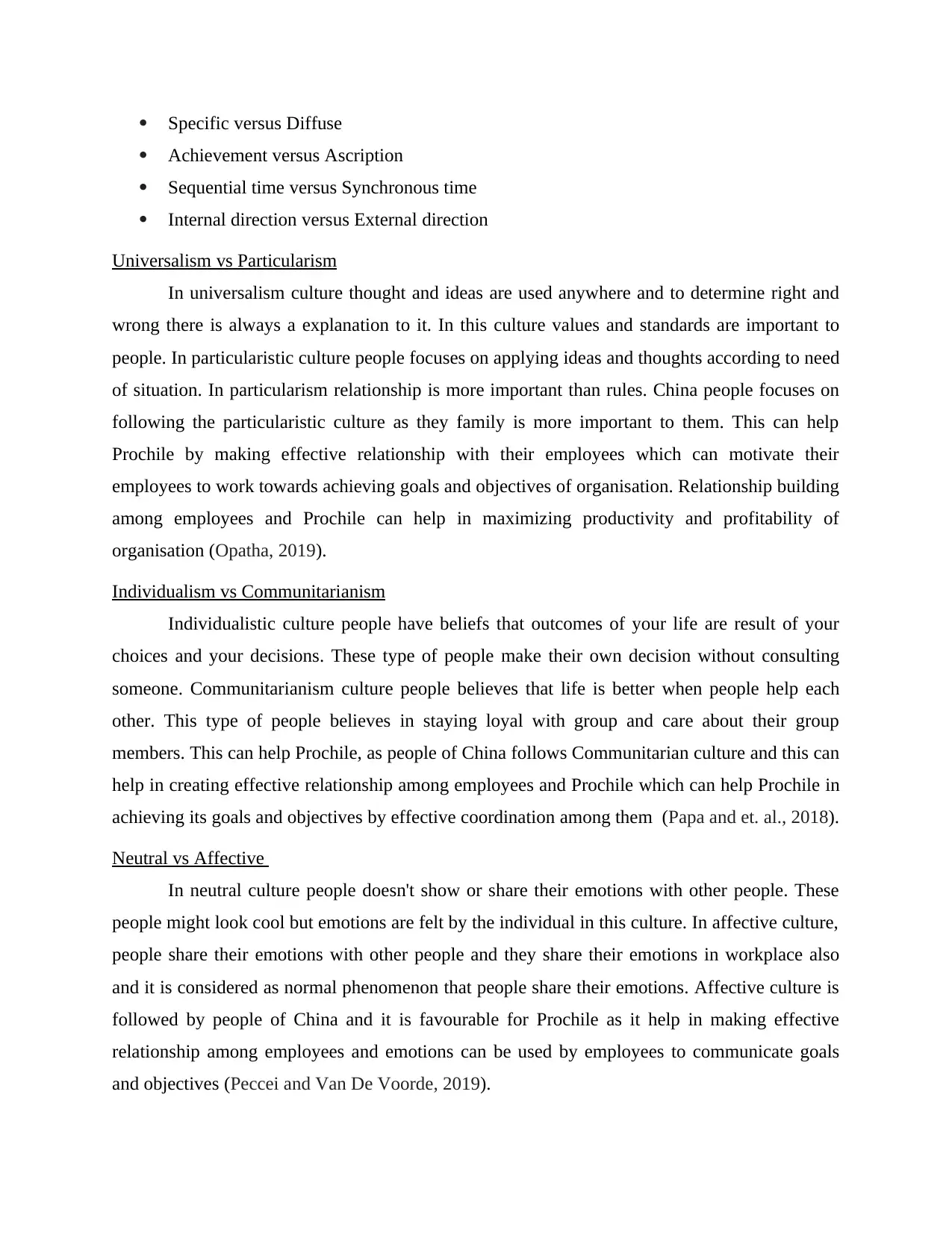
Specific versus Diffuse
Achievement versus Ascription
Sequential time versus Synchronous time
Internal direction versus External direction
Universalism vs Particularism
In universalism culture thought and ideas are used anywhere and to determine right and
wrong there is always a explanation to it. In this culture values and standards are important to
people. In particularistic culture people focuses on applying ideas and thoughts according to need
of situation. In particularism relationship is more important than rules. China people focuses on
following the particularistic culture as they family is more important to them. This can help
Prochile by making effective relationship with their employees which can motivate their
employees to work towards achieving goals and objectives of organisation. Relationship building
among employees and Prochile can help in maximizing productivity and profitability of
organisation (Opatha, 2019).
Individualism vs Communitarianism
Individualistic culture people have beliefs that outcomes of your life are result of your
choices and your decisions. These type of people make their own decision without consulting
someone. Communitarianism culture people believes that life is better when people help each
other. This type of people believes in staying loyal with group and care about their group
members. This can help Prochile, as people of China follows Communitarian culture and this can
help in creating effective relationship among employees and Prochile which can help Prochile in
achieving its goals and objectives by effective coordination among them (Papa and et. al., 2018).
Neutral vs Affective
In neutral culture people doesn't show or share their emotions with other people. These
people might look cool but emotions are felt by the individual in this culture. In affective culture,
people share their emotions with other people and they share their emotions in workplace also
and it is considered as normal phenomenon that people share their emotions. Affective culture is
followed by people of China and it is favourable for Prochile as it help in making effective
relationship among employees and emotions can be used by employees to communicate goals
and objectives (Peccei and Van De Voorde, 2019).
Achievement versus Ascription
Sequential time versus Synchronous time
Internal direction versus External direction
Universalism vs Particularism
In universalism culture thought and ideas are used anywhere and to determine right and
wrong there is always a explanation to it. In this culture values and standards are important to
people. In particularistic culture people focuses on applying ideas and thoughts according to need
of situation. In particularism relationship is more important than rules. China people focuses on
following the particularistic culture as they family is more important to them. This can help
Prochile by making effective relationship with their employees which can motivate their
employees to work towards achieving goals and objectives of organisation. Relationship building
among employees and Prochile can help in maximizing productivity and profitability of
organisation (Opatha, 2019).
Individualism vs Communitarianism
Individualistic culture people have beliefs that outcomes of your life are result of your
choices and your decisions. These type of people make their own decision without consulting
someone. Communitarianism culture people believes that life is better when people help each
other. This type of people believes in staying loyal with group and care about their group
members. This can help Prochile, as people of China follows Communitarian culture and this can
help in creating effective relationship among employees and Prochile which can help Prochile in
achieving its goals and objectives by effective coordination among them (Papa and et. al., 2018).
Neutral vs Affective
In neutral culture people doesn't show or share their emotions with other people. These
people might look cool but emotions are felt by the individual in this culture. In affective culture,
people share their emotions with other people and they share their emotions in workplace also
and it is considered as normal phenomenon that people share their emotions. Affective culture is
followed by people of China and it is favourable for Prochile as it help in making effective
relationship among employees and emotions can be used by employees to communicate goals
and objectives (Peccei and Van De Voorde, 2019).
Paraphrase This Document
Need a fresh take? Get an instant paraphrase of this document with our AI Paraphraser
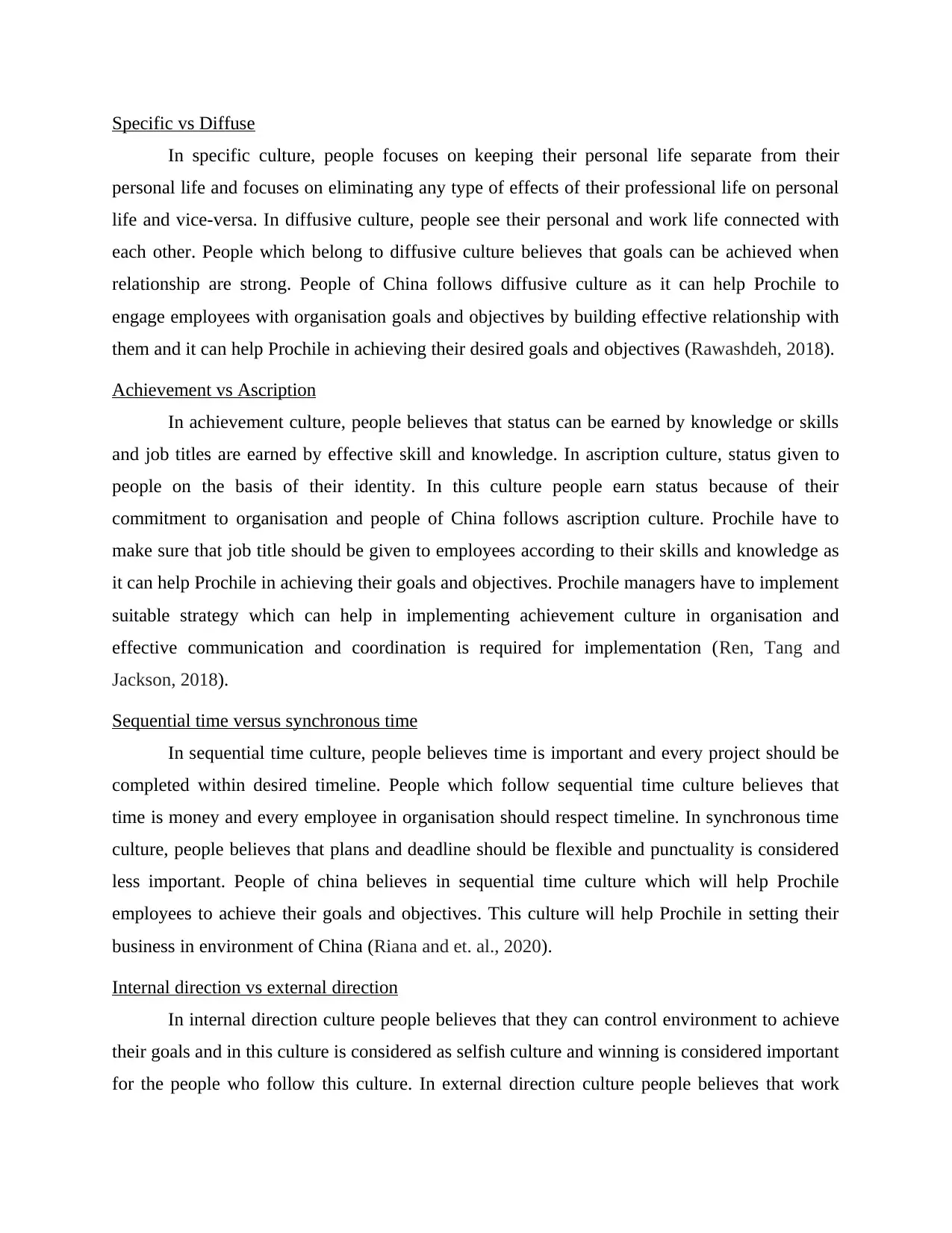
Specific vs Diffuse
In specific culture, people focuses on keeping their personal life separate from their
personal life and focuses on eliminating any type of effects of their professional life on personal
life and vice-versa. In diffusive culture, people see their personal and work life connected with
each other. People which belong to diffusive culture believes that goals can be achieved when
relationship are strong. People of China follows diffusive culture as it can help Prochile to
engage employees with organisation goals and objectives by building effective relationship with
them and it can help Prochile in achieving their desired goals and objectives (Rawashdeh, 2018).
Achievement vs Ascription
In achievement culture, people believes that status can be earned by knowledge or skills
and job titles are earned by effective skill and knowledge. In ascription culture, status given to
people on the basis of their identity. In this culture people earn status because of their
commitment to organisation and people of China follows ascription culture. Prochile have to
make sure that job title should be given to employees according to their skills and knowledge as
it can help Prochile in achieving their goals and objectives. Prochile managers have to implement
suitable strategy which can help in implementing achievement culture in organisation and
effective communication and coordination is required for implementation (Ren, Tang and
Jackson, 2018).
Sequential time versus synchronous time
In sequential time culture, people believes time is important and every project should be
completed within desired timeline. People which follow sequential time culture believes that
time is money and every employee in organisation should respect timeline. In synchronous time
culture, people believes that plans and deadline should be flexible and punctuality is considered
less important. People of china believes in sequential time culture which will help Prochile
employees to achieve their goals and objectives. This culture will help Prochile in setting their
business in environment of China (Riana and et. al., 2020).
Internal direction vs external direction
In internal direction culture people believes that they can control environment to achieve
their goals and in this culture is considered as selfish culture and winning is considered important
for the people who follow this culture. In external direction culture people believes that work
In specific culture, people focuses on keeping their personal life separate from their
personal life and focuses on eliminating any type of effects of their professional life on personal
life and vice-versa. In diffusive culture, people see their personal and work life connected with
each other. People which belong to diffusive culture believes that goals can be achieved when
relationship are strong. People of China follows diffusive culture as it can help Prochile to
engage employees with organisation goals and objectives by building effective relationship with
them and it can help Prochile in achieving their desired goals and objectives (Rawashdeh, 2018).
Achievement vs Ascription
In achievement culture, people believes that status can be earned by knowledge or skills
and job titles are earned by effective skill and knowledge. In ascription culture, status given to
people on the basis of their identity. In this culture people earn status because of their
commitment to organisation and people of China follows ascription culture. Prochile have to
make sure that job title should be given to employees according to their skills and knowledge as
it can help Prochile in achieving their goals and objectives. Prochile managers have to implement
suitable strategy which can help in implementing achievement culture in organisation and
effective communication and coordination is required for implementation (Ren, Tang and
Jackson, 2018).
Sequential time versus synchronous time
In sequential time culture, people believes time is important and every project should be
completed within desired timeline. People which follow sequential time culture believes that
time is money and every employee in organisation should respect timeline. In synchronous time
culture, people believes that plans and deadline should be flexible and punctuality is considered
less important. People of china believes in sequential time culture which will help Prochile
employees to achieve their goals and objectives. This culture will help Prochile in setting their
business in environment of China (Riana and et. al., 2020).
Internal direction vs external direction
In internal direction culture people believes that they can control environment to achieve
their goals and in this culture is considered as selfish culture and winning is considered important
for the people who follow this culture. In external direction culture people believes that work
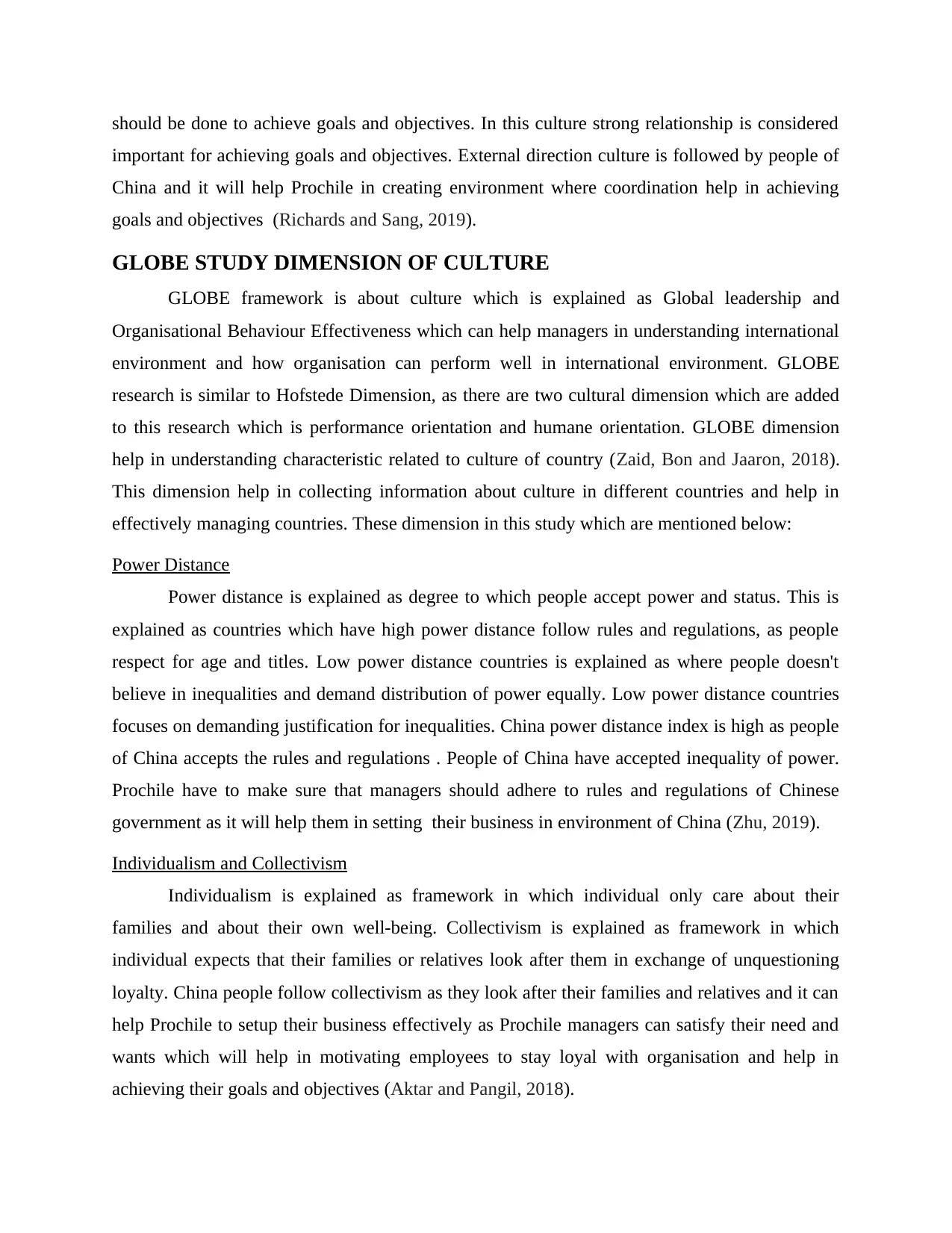
should be done to achieve goals and objectives. In this culture strong relationship is considered
important for achieving goals and objectives. External direction culture is followed by people of
China and it will help Prochile in creating environment where coordination help in achieving
goals and objectives (Richards and Sang, 2019).
GLOBE STUDY DIMENSION OF CULTURE
GLOBE framework is about culture which is explained as Global leadership and
Organisational Behaviour Effectiveness which can help managers in understanding international
environment and how organisation can perform well in international environment. GLOBE
research is similar to Hofstede Dimension, as there are two cultural dimension which are added
to this research which is performance orientation and humane orientation. GLOBE dimension
help in understanding characteristic related to culture of country (Zaid, Bon and Jaaron, 2018).
This dimension help in collecting information about culture in different countries and help in
effectively managing countries. These dimension in this study which are mentioned below:
Power Distance
Power distance is explained as degree to which people accept power and status. This is
explained as countries which have high power distance follow rules and regulations, as people
respect for age and titles. Low power distance countries is explained as where people doesn't
believe in inequalities and demand distribution of power equally. Low power distance countries
focuses on demanding justification for inequalities. China power distance index is high as people
of China accepts the rules and regulations . People of China have accepted inequality of power.
Prochile have to make sure that managers should adhere to rules and regulations of Chinese
government as it will help them in setting their business in environment of China (Zhu, 2019).
Individualism and Collectivism
Individualism is explained as framework in which individual only care about their
families and about their own well-being. Collectivism is explained as framework in which
individual expects that their families or relatives look after them in exchange of unquestioning
loyalty. China people follow collectivism as they look after their families and relatives and it can
help Prochile to setup their business effectively as Prochile managers can satisfy their need and
wants which will help in motivating employees to stay loyal with organisation and help in
achieving their goals and objectives (Aktar and Pangil, 2018).
important for achieving goals and objectives. External direction culture is followed by people of
China and it will help Prochile in creating environment where coordination help in achieving
goals and objectives (Richards and Sang, 2019).
GLOBE STUDY DIMENSION OF CULTURE
GLOBE framework is about culture which is explained as Global leadership and
Organisational Behaviour Effectiveness which can help managers in understanding international
environment and how organisation can perform well in international environment. GLOBE
research is similar to Hofstede Dimension, as there are two cultural dimension which are added
to this research which is performance orientation and humane orientation. GLOBE dimension
help in understanding characteristic related to culture of country (Zaid, Bon and Jaaron, 2018).
This dimension help in collecting information about culture in different countries and help in
effectively managing countries. These dimension in this study which are mentioned below:
Power Distance
Power distance is explained as degree to which people accept power and status. This is
explained as countries which have high power distance follow rules and regulations, as people
respect for age and titles. Low power distance countries is explained as where people doesn't
believe in inequalities and demand distribution of power equally. Low power distance countries
focuses on demanding justification for inequalities. China power distance index is high as people
of China accepts the rules and regulations . People of China have accepted inequality of power.
Prochile have to make sure that managers should adhere to rules and regulations of Chinese
government as it will help them in setting their business in environment of China (Zhu, 2019).
Individualism and Collectivism
Individualism is explained as framework in which individual only care about their
families and about their own well-being. Collectivism is explained as framework in which
individual expects that their families or relatives look after them in exchange of unquestioning
loyalty. China people follow collectivism as they look after their families and relatives and it can
help Prochile to setup their business effectively as Prochile managers can satisfy their need and
wants which will help in motivating employees to stay loyal with organisation and help in
achieving their goals and objectives (Aktar and Pangil, 2018).
⊘ This is a preview!⊘
Do you want full access?
Subscribe today to unlock all pages.

Trusted by 1+ million students worldwide
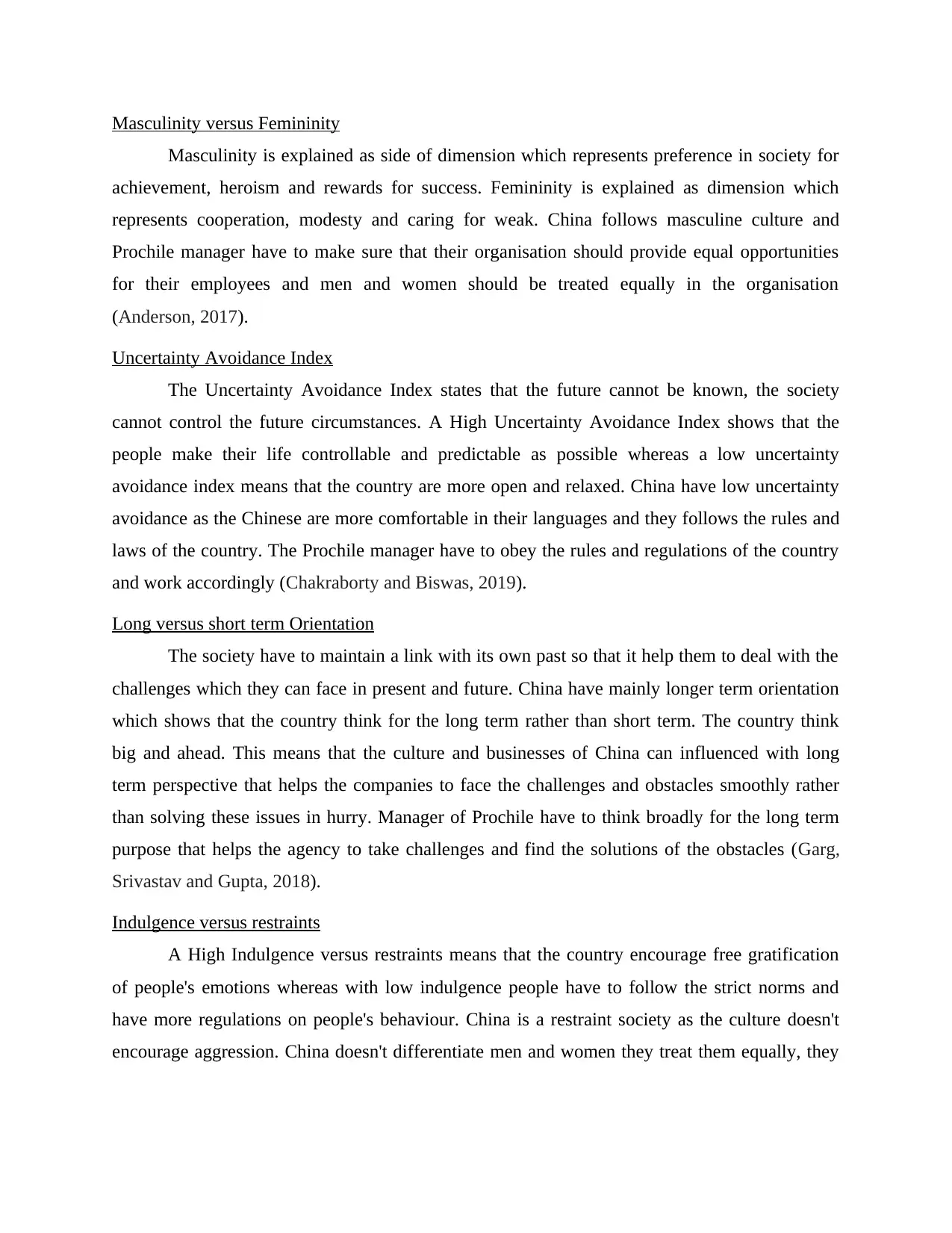
Masculinity versus Femininity
Masculinity is explained as side of dimension which represents preference in society for
achievement, heroism and rewards for success. Femininity is explained as dimension which
represents cooperation, modesty and caring for weak. China follows masculine culture and
Prochile manager have to make sure that their organisation should provide equal opportunities
for their employees and men and women should be treated equally in the organisation
(Anderson, 2017).
Uncertainty Avoidance Index
The Uncertainty Avoidance Index states that the future cannot be known, the society
cannot control the future circumstances. A High Uncertainty Avoidance Index shows that the
people make their life controllable and predictable as possible whereas a low uncertainty
avoidance index means that the country are more open and relaxed. China have low uncertainty
avoidance as the Chinese are more comfortable in their languages and they follows the rules and
laws of the country. The Prochile manager have to obey the rules and regulations of the country
and work accordingly (Chakraborty and Biswas, 2019).
Long versus short term Orientation
The society have to maintain a link with its own past so that it help them to deal with the
challenges which they can face in present and future. China have mainly longer term orientation
which shows that the country think for the long term rather than short term. The country think
big and ahead. This means that the culture and businesses of China can influenced with long
term perspective that helps the companies to face the challenges and obstacles smoothly rather
than solving these issues in hurry. Manager of Prochile have to think broadly for the long term
purpose that helps the agency to take challenges and find the solutions of the obstacles (Garg,
Srivastav and Gupta, 2018).
Indulgence versus restraints
A High Indulgence versus restraints means that the country encourage free gratification
of people's emotions whereas with low indulgence people have to follow the strict norms and
have more regulations on people's behaviour. China is a restraint society as the culture doesn't
encourage aggression. China doesn't differentiate men and women they treat them equally, they
Masculinity is explained as side of dimension which represents preference in society for
achievement, heroism and rewards for success. Femininity is explained as dimension which
represents cooperation, modesty and caring for weak. China follows masculine culture and
Prochile manager have to make sure that their organisation should provide equal opportunities
for their employees and men and women should be treated equally in the organisation
(Anderson, 2017).
Uncertainty Avoidance Index
The Uncertainty Avoidance Index states that the future cannot be known, the society
cannot control the future circumstances. A High Uncertainty Avoidance Index shows that the
people make their life controllable and predictable as possible whereas a low uncertainty
avoidance index means that the country are more open and relaxed. China have low uncertainty
avoidance as the Chinese are more comfortable in their languages and they follows the rules and
laws of the country. The Prochile manager have to obey the rules and regulations of the country
and work accordingly (Chakraborty and Biswas, 2019).
Long versus short term Orientation
The society have to maintain a link with its own past so that it help them to deal with the
challenges which they can face in present and future. China have mainly longer term orientation
which shows that the country think for the long term rather than short term. The country think
big and ahead. This means that the culture and businesses of China can influenced with long
term perspective that helps the companies to face the challenges and obstacles smoothly rather
than solving these issues in hurry. Manager of Prochile have to think broadly for the long term
purpose that helps the agency to take challenges and find the solutions of the obstacles (Garg,
Srivastav and Gupta, 2018).
Indulgence versus restraints
A High Indulgence versus restraints means that the country encourage free gratification
of people's emotions whereas with low indulgence people have to follow the strict norms and
have more regulations on people's behaviour. China is a restraint society as the culture doesn't
encourage aggression. China doesn't differentiate men and women they treat them equally, they
Paraphrase This Document
Need a fresh take? Get an instant paraphrase of this document with our AI Paraphraser
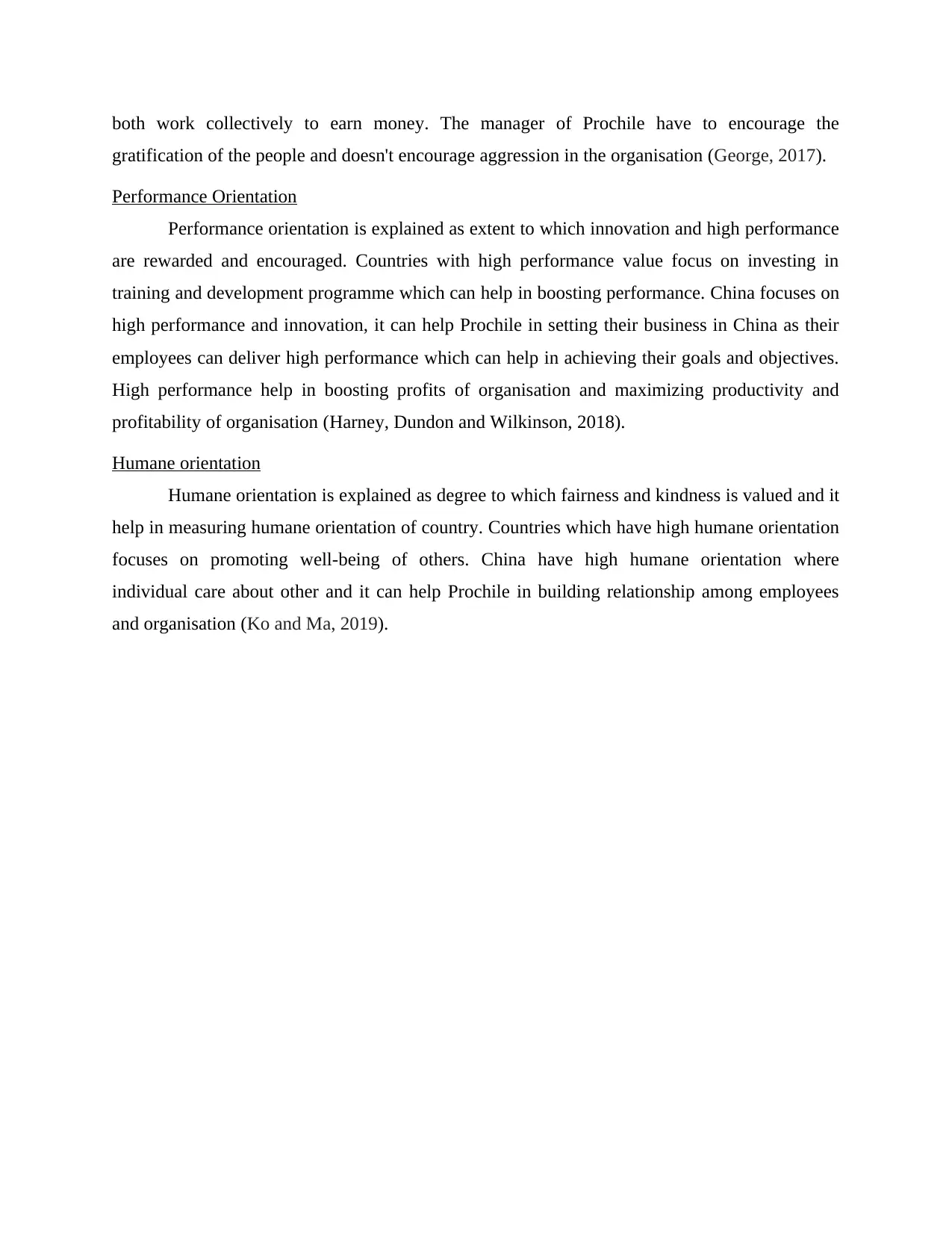
both work collectively to earn money. The manager of Prochile have to encourage the
gratification of the people and doesn't encourage aggression in the organisation (George, 2017).
Performance Orientation
Performance orientation is explained as extent to which innovation and high performance
are rewarded and encouraged. Countries with high performance value focus on investing in
training and development programme which can help in boosting performance. China focuses on
high performance and innovation, it can help Prochile in setting their business in China as their
employees can deliver high performance which can help in achieving their goals and objectives.
High performance help in boosting profits of organisation and maximizing productivity and
profitability of organisation (Harney, Dundon and Wilkinson, 2018).
Humane orientation
Humane orientation is explained as degree to which fairness and kindness is valued and it
help in measuring humane orientation of country. Countries which have high humane orientation
focuses on promoting well-being of others. China have high humane orientation where
individual care about other and it can help Prochile in building relationship among employees
and organisation (Ko and Ma, 2019).
gratification of the people and doesn't encourage aggression in the organisation (George, 2017).
Performance Orientation
Performance orientation is explained as extent to which innovation and high performance
are rewarded and encouraged. Countries with high performance value focus on investing in
training and development programme which can help in boosting performance. China focuses on
high performance and innovation, it can help Prochile in setting their business in China as their
employees can deliver high performance which can help in achieving their goals and objectives.
High performance help in boosting profits of organisation and maximizing productivity and
profitability of organisation (Harney, Dundon and Wilkinson, 2018).
Humane orientation
Humane orientation is explained as degree to which fairness and kindness is valued and it
help in measuring humane orientation of country. Countries which have high humane orientation
focuses on promoting well-being of others. China have high humane orientation where
individual care about other and it can help Prochile in building relationship among employees
and organisation (Ko and Ma, 2019).
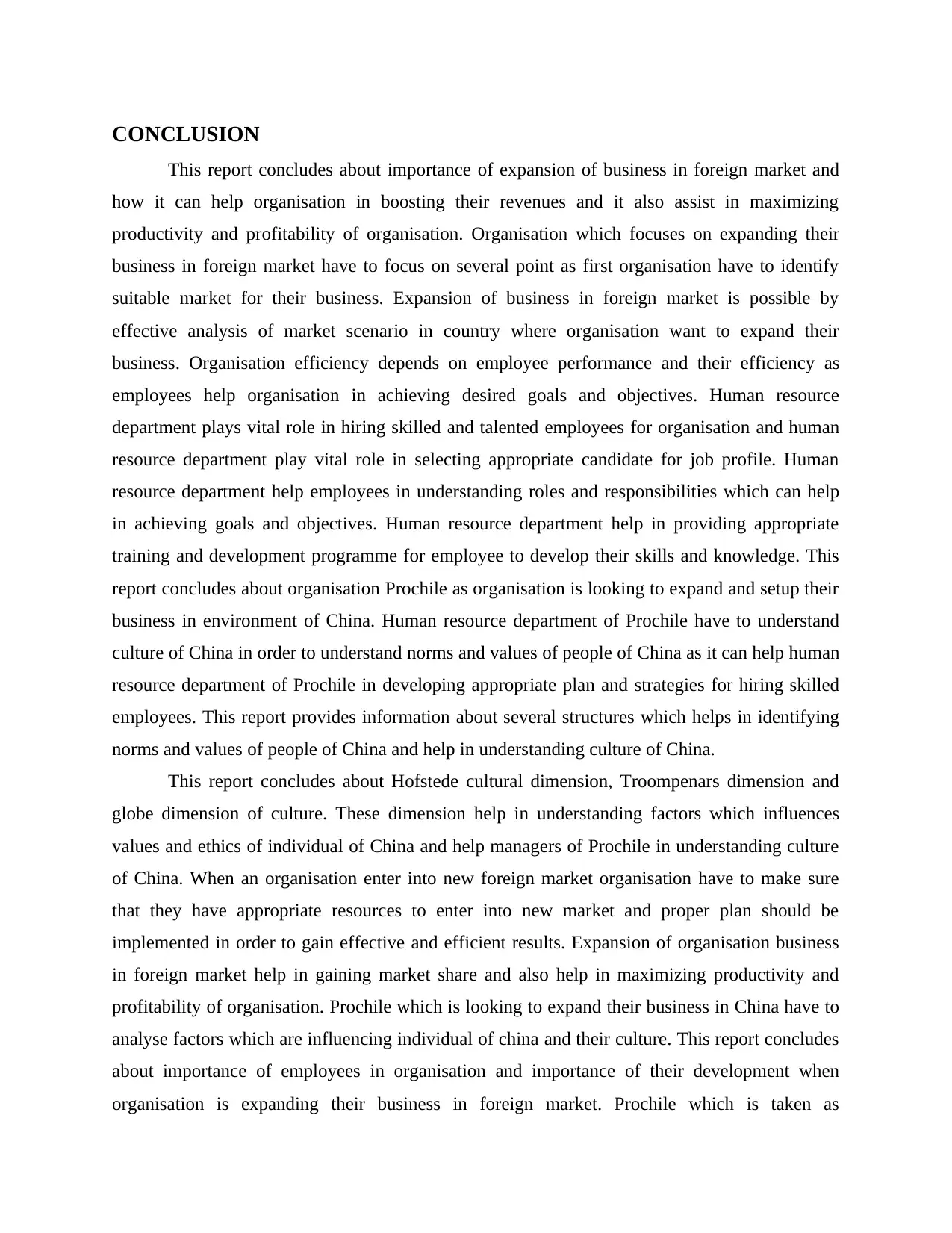
CONCLUSION
This report concludes about importance of expansion of business in foreign market and
how it can help organisation in boosting their revenues and it also assist in maximizing
productivity and profitability of organisation. Organisation which focuses on expanding their
business in foreign market have to focus on several point as first organisation have to identify
suitable market for their business. Expansion of business in foreign market is possible by
effective analysis of market scenario in country where organisation want to expand their
business. Organisation efficiency depends on employee performance and their efficiency as
employees help organisation in achieving desired goals and objectives. Human resource
department plays vital role in hiring skilled and talented employees for organisation and human
resource department play vital role in selecting appropriate candidate for job profile. Human
resource department help employees in understanding roles and responsibilities which can help
in achieving goals and objectives. Human resource department help in providing appropriate
training and development programme for employee to develop their skills and knowledge. This
report concludes about organisation Prochile as organisation is looking to expand and setup their
business in environment of China. Human resource department of Prochile have to understand
culture of China in order to understand norms and values of people of China as it can help human
resource department of Prochile in developing appropriate plan and strategies for hiring skilled
employees. This report provides information about several structures which helps in identifying
norms and values of people of China and help in understanding culture of China.
This report concludes about Hofstede cultural dimension, Troompenars dimension and
globe dimension of culture. These dimension help in understanding factors which influences
values and ethics of individual of China and help managers of Prochile in understanding culture
of China. When an organisation enter into new foreign market organisation have to make sure
that they have appropriate resources to enter into new market and proper plan should be
implemented in order to gain effective and efficient results. Expansion of organisation business
in foreign market help in gaining market share and also help in maximizing productivity and
profitability of organisation. Prochile which is looking to expand their business in China have to
analyse factors which are influencing individual of china and their culture. This report concludes
about importance of employees in organisation and importance of their development when
organisation is expanding their business in foreign market. Prochile which is taken as
This report concludes about importance of expansion of business in foreign market and
how it can help organisation in boosting their revenues and it also assist in maximizing
productivity and profitability of organisation. Organisation which focuses on expanding their
business in foreign market have to focus on several point as first organisation have to identify
suitable market for their business. Expansion of business in foreign market is possible by
effective analysis of market scenario in country where organisation want to expand their
business. Organisation efficiency depends on employee performance and their efficiency as
employees help organisation in achieving desired goals and objectives. Human resource
department plays vital role in hiring skilled and talented employees for organisation and human
resource department play vital role in selecting appropriate candidate for job profile. Human
resource department help employees in understanding roles and responsibilities which can help
in achieving goals and objectives. Human resource department help in providing appropriate
training and development programme for employee to develop their skills and knowledge. This
report concludes about organisation Prochile as organisation is looking to expand and setup their
business in environment of China. Human resource department of Prochile have to understand
culture of China in order to understand norms and values of people of China as it can help human
resource department of Prochile in developing appropriate plan and strategies for hiring skilled
employees. This report provides information about several structures which helps in identifying
norms and values of people of China and help in understanding culture of China.
This report concludes about Hofstede cultural dimension, Troompenars dimension and
globe dimension of culture. These dimension help in understanding factors which influences
values and ethics of individual of China and help managers of Prochile in understanding culture
of China. When an organisation enter into new foreign market organisation have to make sure
that they have appropriate resources to enter into new market and proper plan should be
implemented in order to gain effective and efficient results. Expansion of organisation business
in foreign market help in gaining market share and also help in maximizing productivity and
profitability of organisation. Prochile which is looking to expand their business in China have to
analyse factors which are influencing individual of china and their culture. This report concludes
about importance of employees in organisation and importance of their development when
organisation is expanding their business in foreign market. Prochile which is taken as
⊘ This is a preview!⊘
Do you want full access?
Subscribe today to unlock all pages.

Trusted by 1+ million students worldwide
1 out of 15
Related Documents
Your All-in-One AI-Powered Toolkit for Academic Success.
+13062052269
info@desklib.com
Available 24*7 on WhatsApp / Email
![[object Object]](/_next/static/media/star-bottom.7253800d.svg)
Unlock your academic potential
Copyright © 2020–2025 A2Z Services. All Rights Reserved. Developed and managed by ZUCOL.





